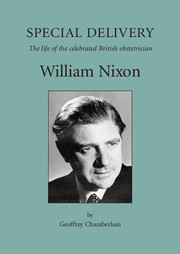Book contents
- Frontmatter
- Contents
- Foreword
- Preface
- Introduction
- Acknowledgements
- Chapter One Early Days (1903–1918)
- Chapter Two The Medical Student (1922–1927)
- Chapter Three Postgraduate Training (1927–1934)
- Chapter Four Consultancies: at Home and Away (1935–1939)
- Chapter Five The War Years (1939–1945)
- Chapter Six The Obstetric Unit in Nixon's Time (1946–1966)
- Chapter Seven Research in the Obstetric Unit (1946–1956)
- Chapter Eight Teaching at UCH (1946–1966)
- Chapter Nine Nixon the Man (1928–1965)
- Chapter Ten Last Days
- APPENDICES
- SOURCES
- INDEX
Foreword
Published online by Cambridge University Press: 05 February 2014
- Frontmatter
- Contents
- Foreword
- Preface
- Introduction
- Acknowledgements
- Chapter One Early Days (1903–1918)
- Chapter Two The Medical Student (1922–1927)
- Chapter Three Postgraduate Training (1927–1934)
- Chapter Four Consultancies: at Home and Away (1935–1939)
- Chapter Five The War Years (1939–1945)
- Chapter Six The Obstetric Unit in Nixon's Time (1946–1966)
- Chapter Seven Research in the Obstetric Unit (1946–1956)
- Chapter Eight Teaching at UCH (1946–1966)
- Chapter Nine Nixon the Man (1928–1965)
- Chapter Ten Last Days
- APPENDICES
- SOURCES
- INDEX
Summary
Professor William Nixon directed the Obstetric Unit at University College Hospital (UCH), London, for twenty years from 1946 to 1966. These were innovative times in obstetrics and gynaecology and Nixon was among the innovators. Much that is now accepted as normal good practice was pioneered by him and today's management of pregnant women and their babies stems from his work. He was a humane doctor and he expected this of all who worked with him. Pregnancies come from two people and Will Nixon saw to it at UCH that both were recognised. Thoughtful treatment of father and mother were the norm. In both obstetrics and gynaecology, Nixon's researches led to new scientific ideas being introduced first at UCH, then nationally and in turn worldwide. Professor Nixon sent the men and women that he trained to all parts of the world and there they carried out his principles, which still live on.
I was a medical student at UCH fifty years ago. Falling under the Professor's influence I went into obstetrics and gynaecology for life. Now, in retirement from clinical medicine, I work in the History of Medicine Unit at the Clinical Medical School, University of Wales in Swansea, and have time to research and write about the life of my master.
- Type
- Chapter
- Information
- Special DeliveryThe Life of the Celebrated British Obstetrician, William Nixon, pp. v - viPublisher: Cambridge University PressPrint publication year: 2004

